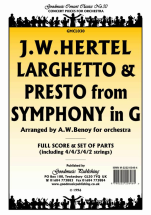Larghetto & Presto -from Symphony in G
Buy this item (in stock)
Product ID: GM1 CL030
By Johann Wilhelm Hertel
Publisher:
Goodmusic
Arranger:
Benoy
Series:
Concert Classics
Genre:
Classical
Line Up:
Symphony Orchestra
Duration:
5:00
Level: 3
Set & Score
This item is in stock
About this item
Johann Wilhelm Hertel was born in Eisenach in 1727 and lived in Schwerin, North Germany, as court musician and composer of both church and secular music, and these two movements display a gift for elegant and attractive melody. In the original version they are scored for strings,horns and continuo with flutes and bassoons in the Larghetto and flutes and oboes in the Presto. In the present arrangement the movements have been rescored to suit the resources of school and amateur orchestras. This arrangement is complete for strings only. The piano and wind parts are optional. The solo violin and viola parts may be played by a small group or even tutti. The solo sections are slightly more difficult than the tutti sections. The piano, if used, plays from the score. No separate part is published.
Instrumentation
2 Descant recorders, 2 Flutes, 2 Clarinets in Bb, Horn in F, 2 Trumpets in Bb, Trombone Strings (Violin 1, Violin 2, Viola or Violin 3, Cello, Bass) Piano [optional] - plays from full score
Reviews and rating
No review available, be the first to write one!

Composer
Johann Wilhelm Hertel (1727-1789)
ohann Wilhelm Hertel (9 October 1727 – 14 June 1789) was a German composer, harpsichord and violin player.
He was born in Eisenach, into a family of musicians. His father, Johann Christian Hertel (1697-1754) was Konzertmeister (from 1733) and director of music at the Eisenach court, while his grandfather, Jakob Christian Hertel (ca. 1667-ca. 1726), had been Kapellmeister in Oettingen and later Merseburg. At an early age Johann Wilhelm accompanied his father, an accomplished viol player, on tour at the harpsichord. He also learned the violin, which he studied with Franz Benda. In 1742 he came with his father to Mecklenburg-Strelitz where he was active playing both instruments. Among his pupils there was Carl Friedrich Christian Fasch (1736-1800). After further music studies in Zerbst and Berlin, Hertel moved to the Duchy of Mecklenburg-Schwerin, where he made a successful career, initially as principal and later becoming court composer, and likewise undertaking teaching. During the reign of Duke Christian Ludwig II, Hertel wrote primarily representative instrumental music, while during the reign of his successor, Friedrich (called 'the pious') he focused on sacred music. In 1770 he was appointed court counsellor and served also as private secretary to princess Ulrike. He died at Schwerin.
Hertel wrote a great number of symphonies, solo concertos, harpsichord sonatas, songs, hymns, cantatas and oratorios. He is considered an important representative of the 'emotional style' of the German pre-classic.
More info about the composer...



 Click above to view samples
Click above to view samples
